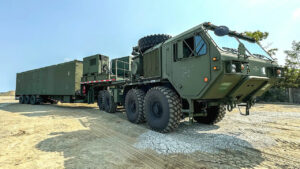Senator pushes to keep US missile system in Manila amid Chinese ‘aggression’
MANILA should keep Washington’s midrange missile system left behind in April to keep Beijing at bay amid its aggressive actions in the South China Sea, a Philippine senator said on Thursday. “I am in favor of retaining defensive missile systems in the Philippines as a deterrent for any future provocative actions,” Senator Juan Miguel F. […]

MANILA should keep Washington’s midrange missile system left behind in April to keep Beijing at bay amid its aggressive actions in the South China Sea, a Philippine senator said on Thursday.
“I am in favor of retaining defensive missile systems in the Philippines as a deterrent for any future provocative actions,” Senator Juan Miguel F. Zubiri told a forum at the Senate.
“Remember, it’s a defensive weapon system, not an offensive system.”
He noted that investing in defensive and protective weapons systems aboveboard since the Constitution only bars procuring nuclear weapons for national defense.
Washington has no plans to withdraw its Typhon missile system from the Philippines and is studying its use in a regional conflict, Reuters earlier reported.
China and Russia have criticized the move, saying it could fuel an arms race in the region.
Manila is considering all security options that would deter Chinese aggression in the waterway amid the US keeping the missile system in the country, Defense Secretary Gilberto Eduardo Gerardo C. Teodoro, Jr. told reporters on Tuesday.
The US Army flew the Typhon, which can launch missiles including SM-6 missiles and Tomahawks with a range exceeding 1,600 kilometers (994 miles), to the Philippines in April in what it called a “historic first” and a “significant step in our partnership with the Philippines.”
The Philippines is open to acquiring the Typhon midrange missile system, Agusan del Norte Rep. Jose “Joboy” S. Aquino II said last week, as he sponsored the 2025 budget of the Defense department.
Mr. Zubiri said missile systems would complement the radar systems given by Japan that would be detect attacks in the South China Sea.
“These radar systems are not enough since even if these allow you to see these attacks, we still need to defend ourselves,” he said in Filipino.
Senate President Francis “Chiz” G. Escudero earlier told foreign journalists that the chamber is planning to ratify Manila’s reciprocal access agreement with Tokyo before the year ends.
The military pact, which was signed in July, eases the entry of equipment and troops for combat training from Japan and to ensure stability in the region amid growing tensions with China.
The Philippines has a visiting forces agreement with the United States and Australia. Tokyo, which hosts the biggest concentration of US forces abroad, has a similar deal with Australia and Britain, and is negotiating another with France.
A United Nations-backed tribunal based in the Hague in 2016 voided China’s expansive claims in the South China Sea for being illegal, which Beijing has rejected.
“As long China is this provocative, then we welcome all the support because we cannot do this alone,” the ex-Senate president said. — John Victor D. Ordoñez























